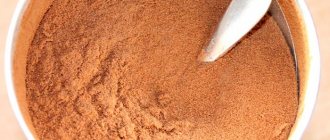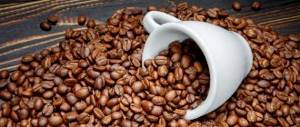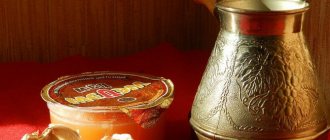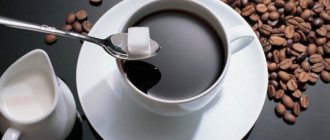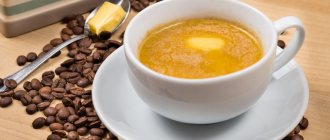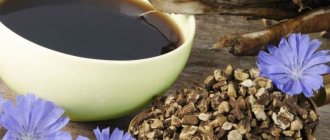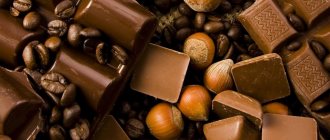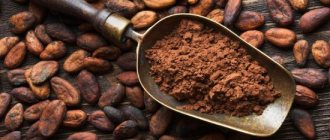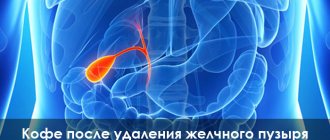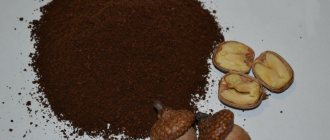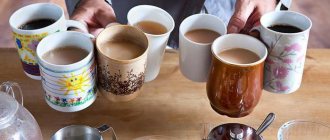Inflammation of the gallbladder and drinking coffee
The principle of treating inflammation is to reduce the load, eliminate pain, which is very strong with cholecystitis, dissolve bile and increase its fluidity, as well as relieve inflammation inside the bladder.
How coffee affects the gallbladder - harm and benefit:
- If you drink a lot of it without drinking water, the bile will thicken and be deposited in the form of salts, which subsequently form stones.
- When consumed on an empty stomach, the load on the entire gastrointestinal tract increases, which has a bad effect on further digestion of food.
- Stagnation of bile occurs in the hepatic ducts and bladder.
- Coffee has a choleretic effect, so in case of calculous cholecystitis, large doses of a strong drink can cause contractions of the walls and the stones will begin to move along the ducts, which can cause blockage and an attack of acute pain.
Is it possible to drink coffee if you have cholelithiasis: women and men have different statistics for this disease. Mostly women get sick, so they especially need to follow a diet and drink water during frequent coffee feasts.
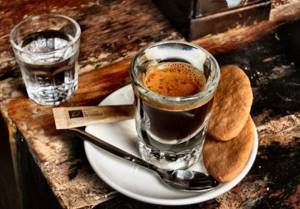
With proper consumption of the drink, the condition of the digestive tract can be improved: it can renew liver cells, remove harmful substances, but this requires water in which they will dissolve and leave the body. Use essential oils to stop the action of pathogenic microorganisms.
The effect of coffee on liver diseases
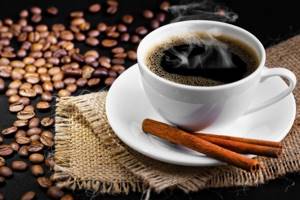
Italian experts have proven that 2 cups of espresso a day helps reduce the likelihood of developing liver carcinoma by up to 40%. Coffee for liver cirrhosis does more good than harm. It is able to neutralize dangerous components that lead to pathology of the filtering organ. These include: alanine, serum aminotransferase and aliphatic amino acid. In order for the drink to be beneficial for the patient, it is necessary to discuss the number of cups per day with the doctor. In addition, coffee reduces the concentration of iron in the liver and prevents the replacement of liver connective tissue, which helps prevent the onset of cirrhosis.
But is it possible to drink coffee if there is stagnation of bile? This is strictly not recommended. During roasting of coffee beans, elements appear that cause the rapid secretion of bile. As a result, this can worsen the situation and lead to inflammation of the gallbladder.
Coffee and hepatitis C
Experts from the Cancer Institute in the United States of America conducted an experiment in which people with chronic hepatitis C participated. The patients were divided into three categories: some drank regular coffee beans; the second - the same drink, but without caffeine; the third were prohibited from drinking coffee. The study continued for two years.
The results were unexpected. In the first group, the development of pathology sharply decreased; patients began to develop resistance to the hepatitis virus. In the second and third groups, no changes were observed: the disease stopped at the same level. In addition, it was found that the use of coffee drink reduces the amount of alanine (a substance that causes liver damage) and prevents the appearance of fibrous scars on the liver.
Important! According to the results of the research, it was found that when drinking coffee, the likelihood of cirrhosis is reduced to 20%.

Drinking coffee can reduce the risk of liver cirrhosis
Coffee consumption and liver cancer
Hepatocellular carcinoma is the most common primary form of liver cancer. Doctors from the University of Southampton found that if a patient drinks 1 cup of drink per day, the risk of disease progression will decrease by 20%; if coffee consumption increases to 2 cups, the likelihood of developing carcinoma will decrease to 35%.
The caffeine-free drink also exhibits anti-cancer properties, but they are less pronounced. Drinking more than 3 cups of coffee drink per day is contraindicated as it can cause health problems.
Cholelithiasis
Coffee has a positive effect on the gallbladder if used as a prophylactic. The drink has a diuretic effect, preventing stones from accumulating in the kidneys and the organ itself, and also reduces the concentration of cholesterol in bile.
Is it possible to drink coffee if you have gallstones? This time the answer will be no. Drinking the drink contracts the gallbladder, and the stones move towards the ducts, which causes severe pain and aggravation. Due to the fact that coffee is poorly digested, it is included in the list of prohibited foods in diet No. 5, which is prescribed for gallstone disease.
Is it possible to drink coffee if the gallbladder has been removed?
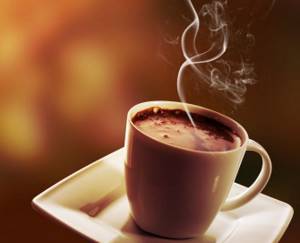
However, not all doctors share this opinion. Caffeine and chlorogenic acids excite the gastrointestinal tract and cause increased secretion of bile, and since it now has nowhere to be stored, this can be dangerous. But the final decision on whether you can drink coffee with milk after removal of the gallbladder is made by the doctor. Typically, a drink is allowed if several requirements are met:
- Drink one cup per day an hour after meals, between 9.30 and 11.30.
- Coffee must be diluted with low-fat milk. It is advisable that it be espresso or ristretto.
- It is strictly contraindicated to drink instant coffee, since it contains a large number of preservatives, flavors, dyes and other chemicals.
- You should not take black coffee, which can cause pain, colic and diarrhea.
Coffee has a lot of positive properties that have a beneficial effect on the liver. The drink accelerates metabolic processes, cleanses the liver of toxins, and slows down pathological processes in oncology and hepatitis C. It must be remembered that only coffee made from natural coffee beans can be beneficial. Soluble powder contains a large number of preservatives, flavors and other chemical compounds that can be harmful to health.
Coffee for hepatitis - benefit or harm
In case of severe liver diseases - cancer, hepatitis C - coffee beans can improve the condition and even stop the development of pathology. This is evidenced by a study that was conducted in America. It involved patients with hepatitis C. In the first group, who were recommended to drink 1 cup a day, an immune reaction to the virus was observed, which indicates increased immune defense.
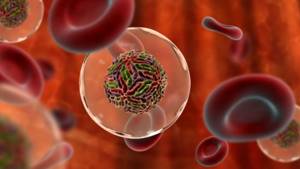
People with congenital pathologies of the liver tissue need to drink 2 cups of espresso a day, diluted with clean still water, to eliminate congestion and improve metabolism. This helps relieve intoxication and prevent the degeneration of parenchyma into connective or adipose tissue.
Cholelithiasis
Bile
is formed in the liver and is needed for digestion: it dissolves fats, neutralizes the acidic contents of food gruel from the stomach, and stimulates peristalsis. Harmful substances (for example, some medications) are excreted with bile. Part of the bile accumulates in the gallbladder (its volume is up to 60 ml, but it easily stretches and can freely accommodate up to 200 ml of bile). The gallbladder is capable of concentrating bile 10-20 times or more. A person produces 800-1200 ml of bile per day.
Composition of gallbladder bile:
• Water - about 84%. • Bile acids - 7%. • Mucin and pigments - 4.1%. • Minerals - 0.8%. • Fat – 3.1%. • Cholesterol - 0.6% and several other substances.
Cholesterol
80% is formed in the liver and 20% comes from food. It is part of cell membranes and sex hormones. Excess cholesterol is deposited in blood vessels, disrupting blood circulation and leading to heart attacks (CHD) and strokes.
Diet
can significantly affect the formation of gallstones.
It is known that some foods have the ability to dissolve cholesterol. But there are also those that provoke an attack of biliary colic. Nutritionists recommend eating more vegetables
.
As already noted, cholelithiasis is a fairly rare occurrence in vegetarians. And people who have a lot of nuts, legumes, and oranges in their diet are especially successful in resisting the disease, since plant proteins have the ability to reduce the concentration of cholesterol in bile. People who have stones should give up coffee
.
Black coffee without sugar or cream, with or without caffeine, can cause contractions of the gallbladder, which lead to an attack of gallstones. Just half a cup of coffee stimulates gallbladder contractions. Stone formation is promoted by fasting
, very long breaks between meals or refusal of breakfast.
Those who have not eaten for 14 hours or more, skipping breakfast, have the most stones. Breaks of less than 8 hours reduce the risk of stone formation. Without nutrition, the digestive system does not produce enough bile acids, which can dissolve cholesterol and prevent it from precipitating in the form of stones. Even a slight excess of normal body weight
results in a threat of stone formation, and this is especially true for middle-aged women.
Even an extra 10 kg doubles the risk. Excess fat in the body is converted into cholesterol, which, in combination with bile, becomes the basis for stone formation. However, rapid weight loss
is one of the surest ways to provoke gallstone disease.
A low-calorie, low-fat diet (up to 600 kilocalories and less than 3 grams of fat per day) leads to the formation of gallstones in 50% of cases. The danger can be avoided by adding 5-10 g of fat to each meal (for example, 2 teaspoons of olive oil). Fat is necessary
in order to stimulate the gallbladder and release the bile that has accumulated in it. With a sharp reduction in fat intake, the gallbladder begins to contract less frequently and release bile into the intestines, and stagnation of bile leads to the formation of stones.
Measures to prevent cholelithiasis:
1. Eat a plant-based diet; your diet should include nuts and legumes (peas, beans). 2. Watch your weight (every 10 kg doubles the risk), but do not starve. 3. You need to eat little and often so that bile does not accumulate in the gallbladder. 4. It is useful to add 1-2 teaspoons of vegetable (olive) oil to food (fat is needed to stimulate the gallbladder and the formation of bile acids). 5. If you already have gallstones, give up the strong gallbladder stimulant - coffee.
Symptoms of gallstone disease:
1. Feeling of bitterness in the mouth. 2. Periodic moderate pain and heaviness in the right hypochondrium that occurs after eating, especially after eating fatty and spicy foods, and alcohol. 3. These painful sensations may be accompanied by weakness, bloating, and heartburn.
Coffee is reviled and deified in equal measure. Is it possible to get a real threat, or, conversely, salvation from an aromatic drink in relation to a single organ - the gallbladder, for example?
Calculous cholecystitis and strong coffee
The effect of strong coffee on the gallbladder for cholecystitis is negative. Especially if you drink it on an empty stomach. It is recommended to brew a light drink and drink it after meals once a day. At the same time, follow the principles of diet No. 5 and the water regime. It is advisable to add low-fat milk, or vegetable milk, to reduce the concentration of caffeine in a serving and reduce the negative impact on the inner lining of the diseased organ.
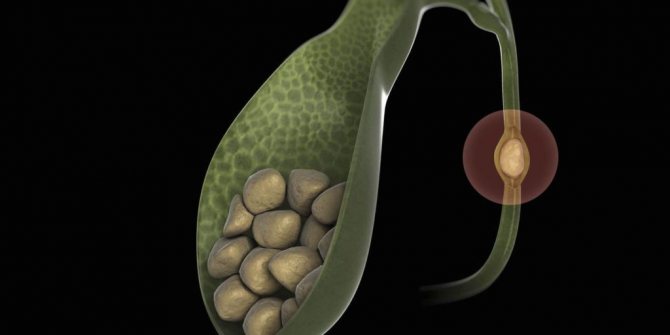
Natural grains after cholecystectomy
Is it possible to drink coffee with milk if you have gallstones and after removal of the organ? Here the opinions of doctors are divided. Some believe that after 2 weeks the drink can be consumed with caution.
Others say that this will cause irritation to the gastrointestinal tract and provoke increased bile formation, which can negatively affect the mucous membrane of the small intestine and disrupt its functioning. There is no bile storage, so strong coffee is now contraindicated. In this situation, it is necessary to focus on your well-being. Instant coffee is especially harmful - it is completely avoided in case of diseases of the gallbladder and liver.
The effect of coffee on the body with cholecystitis
You can easily track the effect of your favorite drink on your body. Coffee itself stimulates the gastrointestinal tract, enhances the functioning of all systems, as a result, gastric juice is actively secreted, and the gallbladder produces more bile than required. It stretches, increases in volume, the person feels pain, heaviness, and nausea.
In critical cases, if you do not take care of yourself, there is every risk of ending up on the operating table, where the gallbladder will simply be cut out, and then you will not be able to drink any coffee for the rest of your life. So be very attentive to yourself, drink coffee only when in remission, and follow all the rules.
To drink or not to drink coffee?
The answer to the question can be very brief: a healthy person should drink if he really wants to, but in moderation and of good quality.
For certain diseases, coffee should be consumed to a minimum. Milk and sugar, as the favorite ingredients of the drink, also impose a number of restrictions.
Coffee should be considered in the complex of characteristics of a particular person. Like, in principle, any product. Naturally, unbridled consumption of coffee will lead to disturbances in the body (not necessarily the biliary system).
Coffee is just a product. It is difficult to trace the direct relationship between the effects of coffee on your healthy gallbladder.
Already existing chronic diseases (hypertension, disorders of the central nervous system, obesity) in combination with constant consumption of coffee will become an impetus for the development of gallbladder diseases.
At the same time, for hypotensive people, people with an inactive, slow temperament, drinking coffee with a strong desire will be useful, including for the gallbladder. After taking the desired drink, such people’s blood pressure stabilizes and they have energy for active actions, even physical exercise. After an excellent workout, the flow of bile increases and digestion improves. Therefore, coffee had an extremely beneficial effect for this patient.
Much about the properties of coffee has been invented by corporations for marketing purposes; there are also proven properties. Research on the benefits and harms of coffee often contradicts each other. Thus, only relatively recently in 2021, the World Health Organization removed the stigma of a cancer-causing drink from coffee. Today, coffee has been transferred from the first category of danger to the third (possible, unproven effect of an excessively hot drink on esophageal cancer).
Can I drink coffee after gallbladder removal?
Coffee after surgery to remove the gallbladder is strictly prohibited in the first two weeks of the rehabilitation period. Drinking the drink in the future is not advisable. Doctors are sure of this.
Why do doctors prohibit drinking coffee after surgery?
Laparoscopy followed by organ removal is today the most effective and frequently used method of treating acute cholecystitis and symptomatic cholelithiasis.
The rehabilitation period after it is accompanied by strict adherence to a special diet, the effect of which is aimed at suppressing the function of bile formation in order to give the body the opportunity to rebuild, learn to live and function without a bladder in which excess bile had previously accumulated. Therefore, the use of stimulants such as coffee is unacceptable during this period.
The duration of adaptation is strictly individual, therefore, without the permission of the attending physician, experimenting with nutrition is dangerous to health.
In addition, since bile is a fairly aggressive substance, its frequent and abundant release into the intestinal cavity in large quantities can lead to the development of peptic ulcers.
What drinks are allowed after cholecystectomy?
During the first few weeks, coffee drinks are prohibited. It is recommended to replace them with chicory. When the recovery period is complete, the following drinks are allowed:
- with milk,
- with added spices,
- natural, but weak drink. The main thing is that it is strained from the grounds.
You will have to give up classic espresso. When using it, the following negative changes are possible:
- diarrhea,
- bloating,
- painful sensations.
Instant coffee is prohibited. It contains a huge amount of chemicals.
How to create a menu for bile stagnation
A diet for stagnation of bile in the gallbladder involves eating small amounts every 3-4 hours. Fatty, spicy, fried foods and alcohol are excluded from the diet. A choleretic breakfast should include porridge with the addition of vegetable oil and eggs. Lunch should include lean meats, beef two to three times a week. You should include fermented milk products and salads in your dinner. Between meals, you can snack on fruits, dried apricots, and berries. Every 2-3 hours you should drink tea with lemon, rosehip, fruit and vegetable juices. A child’s diet must include cottage cheese, fruits, cereals, berries, and dried compotes every day.
What are the benefits of coffee for the liver?
So is coffee good for the liver? According to doctors, the aromatic hot drink has many beneficial qualities, namely:
- Reduces the number of pathologically modified cells, favors the restoration of hepatocytes, preventing the likelihood of developing cirrhosis.
- Normalizes the amount of iron and cholesterol in the bloodstream.
- Promotes liver recovery after hepatitis C. Inhibits the activity of receptors that promote the release of alanine aminotransferase.
- Stops the process of scarring in the parenchyma (structure) of the liver, thereby preventing the appearance of fibrosis.
- Reduces the effect of alcoholic drinks and toxic substances. The benefit of fresh coffee for the liver is that the load on the organ is reduced.
- Strong coffee has a choleretic effect. After each meal, bile accumulates in the gallbladder, which must be at least partially eliminated once a day. The benefit of coffee is that it empties the gallbladder, since stagnation can cause harm to the liver in the form of over-absorption of food, excessive release of alkali and the formation of stones.
- Regulates lipid metabolism, resists obesity of the gland.
- Softens the effect of fats on the organ, reducing the likelihood of fatty hepatosis.
Important! In order for the drink to bring only benefits, you need to drink no more than 3 cups a day and in its natural form, namely, made from coffee beans.
Coffee has numerous beneficial properties
How to drink coffee correctly after organ removal
Before you treat yourself to a cup of Americano, you need to eat. An hour after eating, drinking a coffee drink is allowed. It is advisable to dilute it with plenty of milk.
For the first time, it is recommended to drink only a few sips. The body has gone without caffeine for a long time and this will be enough to get a boost of energy. After this, you should monitor the condition. If pain or other negative changes appear, you will have to give up coffee.
